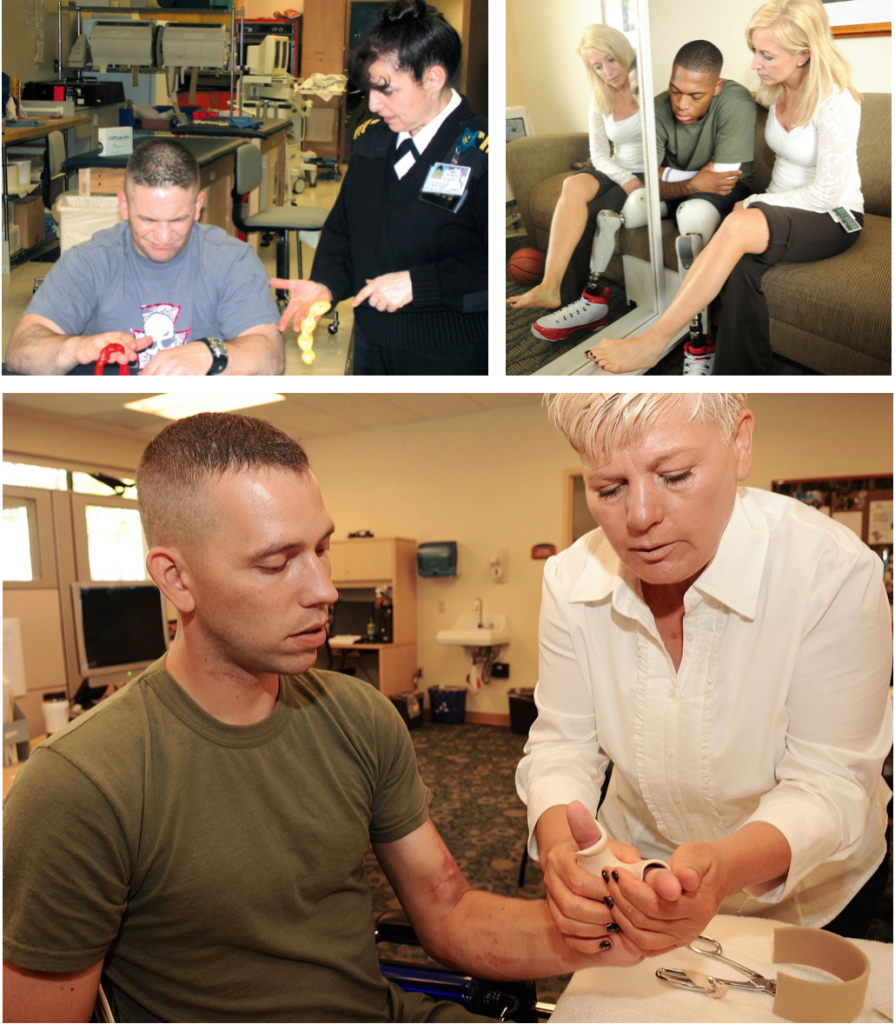An Occupational therapist (OT) is a healthcare professional who helps people of all ages to perform daily activities or occupations they want or need to do.
The goal of an occupational therapist is to help individuals achieve maximum independence and enhance their quality of life through meaningful and purposeful activities.
OTs work with people who have physical, cognitive, developmental, or emotional challenges that affect their ability to perform daily activities such as self-care, work, leisure, and social participation. They also work with individuals who are recovering from injuries, illnesses, or surgeries and need support to regain their skills and abilities.
Occupational therapists may work in a variety of settings, including hospitals, rehabilitation centers, schools, community health centers, and private practice. They work collaboratively with other healthcare professionals, such as doctors, nurses, physical therapists, and speech therapists, to provide comprehensive care to their clients.

Roles of an Occupational Therapist include:
- Evaluation: An occupational therapist evaluates a person’s physical, cognitive, emotional, and environmental factors to determine their strengths and limitations in performing daily activities or occupations.
- Treatment planning: Based on the evaluation, the OT develops an individualized treatment plan with goals to improve the person’s ability to perform daily activities, such as self-care, work, leisure, and social participation.
- Intervention: The OT provides interventions that can include exercises to improve strength, coordination, and balance, adaptive techniques to compensate for limitations, and education on ways to modify the environment to make daily activities easier.
- Rehabilitation: An occupational therapist may work with people who are recovering from an injury or illness to help them regain the skills and abilities they have lost.
- Mental health support: Occupational therapists can address mental health issues such as depression, anxiety, and stress by teaching clients coping skills and strategies to manage their emotions.
- Adaptation and modification: The OT can suggest modifications to a person’s home or work environment to make it safer and more accessible, as well as suggest assistive devices or equipment that can make daily activities easier.
- Patient and family education: The OT educates patients and their families on their condition, treatment, and ways to improve their daily functioning.
Overall, the role of an occupational therapist is to help individuals achieve maximum independence, enhance their quality of life, and promote their overall well-being through meaningful and purposeful activities.
Types of Occupational Therapy
There are various types of occupational therapy that address different areas of daily life and different populations. Some of the different types of occupational therapy include:
- Pediatric occupational therapy: This type of occupational therapy is focused on children and infants, addressing their physical, cognitive, and emotional development to promote growth and independence.
- Geriatric occupational therapy: Geriatric occupational therapy addresses the unique needs of older adults, including physical and cognitive decline, chronic conditions, and mobility and balance issues.
- Hand therapy: This type of occupational therapy is specialized in treating hand and upper extremity injuries and conditions, including fractures, arthritis, carpal tunnel syndrome, and tendonitis.
- Mental health occupational therapy: This type of occupational therapy focuses on addressing mental health conditions, including depression, anxiety, and bipolar disorder, by providing strategies for managing emotions, improving coping skills, and promoting healthy routines.
- Vocational rehabilitation: This type of occupational therapy helps individuals who have disabilities or injuries to improve their job skills and find employment opportunities.
- Driving rehabilitation: Occupational therapists who specialize in driving rehabilitation work with individuals who need to improve their driving skills due to injury, illness, or aging.
- Home modification: This type of occupational therapy involves modifying a person’s home environment to make it safer and more accessible, including adding grab bars, wheelchair ramps, and other adaptive equipment.
Overall, occupational therapy is a flexible and diverse field that provides specialized care for individuals across the lifespan and a variety of conditions.
Benefits of having an Occupational Therapist include:
- Improved independence: Occupational therapists help clients learn or re-learn the skills they need to live as independently as possible. They can teach clients how to use adaptive equipment or modify their environment to make daily activities easier and safer.
- Increased quality of life: OTs can help clients find meaningful activities and hobbies that they enjoy and can continue to do despite physical or cognitive limitations. This can help improve their overall sense of well-being and satisfaction with life.
- Improved physical health: Occupational therapists can design individualized exercise programs to help clients regain strength, coordination, and mobility after an injury or illness.
- Improved mental health: Occupational therapists can address mental health issues such as depression, anxiety, and stress by teaching clients coping skills and strategies to manage their emotions.
- Better communication skills: OTs can work with clients who have communication difficulties due to stroke, brain injury, or other conditions. They can help improve clients’ ability to communicate effectively with others.
- Better job prospects: Occupational therapists can help clients develop vocational skills, such as resume writing and interviewing skills, to help them find and maintain employment.
- Improved caregiver support: OTs can work with family members or caregivers to teach them how to best support their loved ones in daily activities and provide education on techniques or modifications to the environment. This can help reduce caregiver burnout and improve the quality of care provided.
Overall, occupational therapists play a vital role in helping people overcome challenges and improve their daily functioning, independence, and quality of life.